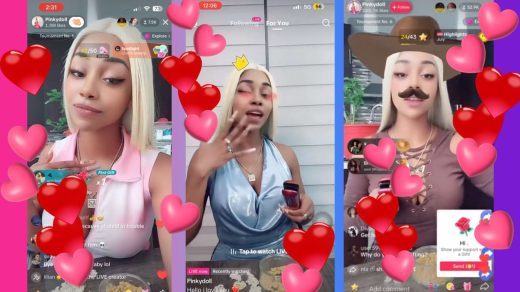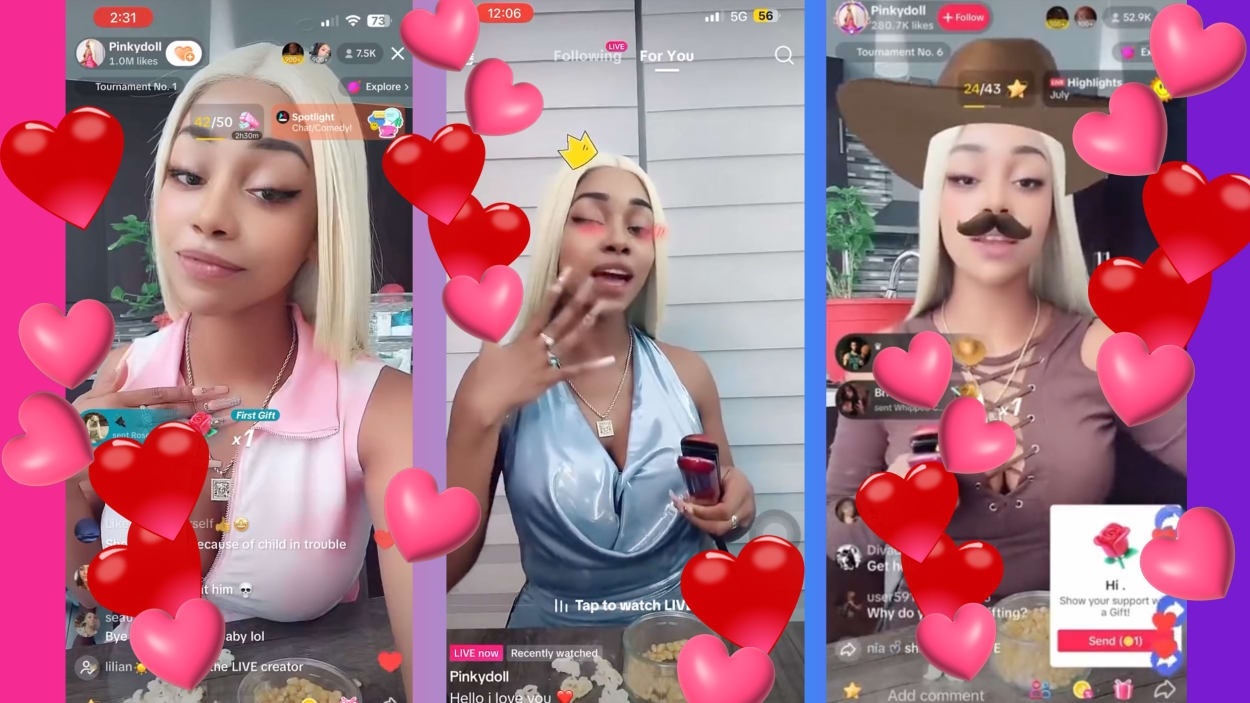POV: PinkyDoll’s NPC streaming lays bare the transactional nature of the creator-fan dynamic
“Ice cream so good” and “yes yes yes” have joined the lexicon of the terminally online, following “baby Gronk is the new rizz king” as a combination of words that separates those who have a life from those who don’t.
The phrases stem from Fedha Sinon, a TikToker from Montreal who posts under the username PinkyDoll. She livestreams herself staring into the camera lens and robotically repeating phrases as viewers of the livestream send her digital gifts—which translate to cash payments—using TikTok’s in-app purchase tool.
Buy PinkyDoll a digital ice cream for a single TikTok coin—around 1.3 cents—and she’ll say “ice cream so good” while lapping her tongue to taste the flavor. Gift her a cowboy hat (which TikTok automatically sets atop her head) and she’ll unenthusiastically say “yeehaw, yes” while miming spinning a lasso. She’ll often do so while showing barely any expression or emotion—except to break character and chastise her child in French Canadian.
Many have rightly pointed out that the PinkyDoll’s deadpan performance mimics non-playable characters (NPCs) in video games. And she’d be far from the first person to grow her following by following in NPCs’ footsteps. A group of Japanese YouTubers called KOMAZAWA ISOLATION went viral last year for their pitch-perfect videos pretending to be characters from the Grand Theft Auto series of games while running around Tokyo. And PinkyDoll is just one of a clutch of creators who have gained notoriety for their unusual, computerlike actions in recent weeks.
Others have pointed to a fetishized undertone to PinkyDoll’s work, arguing that it grants users’ desire to feel like they’re able to control the creators in question. That link is, of course, bolstered by the fact that some so-called NPC creators have OnlyFans accounts where they sell more explicit content.
But beyond those connections, what the popularity of—and horrified reaction to—the NPC trend shows is the way in which nuance has been railroaded out of the creator-audience connection. At its core, this wave of videos exemplifies the transactional nature of being a digital creator.
Consider how PinkyDoll often responds to the gifts she’s given: She pretends to pop kettle corn, one kernel at a time. She knows she has to do something while waiting for the tips to flow in, so she chooses something both domestic but also otherworldly to show that she’s aware of the transaction going on. Viewers get a glimpse into her life, but not the real one. They pay regardless, just to see her say the funny meme words. It’s postmodernism on all sides, with everyone arching their eyebrows.
For creators, it’s a way of capitalizing on the desire for intimacy and closeness with their audience while simultaneously keeping them at arm’s length. They are giving power over their actions to their audience, sure, and arguably pretending that they’re a nonhuman—the kinds of boring characters that linger on the sidelines of video games waiting to be prompted to say their piece, or often repeatedly nagged or shoved out of the way through prerecorded animations. But they’re making money. Every gurn or grin chips away at the humanity of the person behind it—while adding to their bank account.
And for viewers, it’s a way of exerting power over creators, and reminding them that they’re ultimately beholden to the audience’s support for them. Without their backing, creators lose their popularity, fame, and fortune.
The NPC trend collapses the layers of abstraction that both sides of the creator-audience relationship have historically danced around. It gets rid of the parasocial relationship and the idea that either has a vested interest in or kindness for the other. Instead, it highlights a much more brutish, much more straightforward relationship on both sides. The creators have to react to whatever is being bought for them. They know that, and they’re okay with that—because they get paid, and paid plenty: PinkyDoll makes up to $3,000 per stream, and $7,000 a day at present when taking into account her income from other platforms. The viewers know they’re getting played, but it’s okay because they can make someone say a stupid thing while putting on a stupid face . . . and because this is the way the last 20 years of the creator economy have been headed.
The trend, and the transaction involved, removes all pretense from the interaction. It lays bare what the creator-fan relationship is. And despite PinkyDoll’s claim to the New York Times that she’s winning, in reality we’re all losers.
(53)



